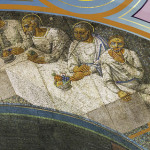We run our website the way we wished the whole internet worked: we provide high quality original content with no ads. We are funded solely by your direct support. Please consider supporting this project.

Does God Intervene?
Given the vast influence of angelic and human free will, what influence does God have in determining what comes to pass? While God has an important role to play in anticipating and creatively responding to decisions agents make, is God only a responder? Does he have anything to do with what’s going on in creation?
The question is extremely important because Christianity is founded on the assumption that God can and does unilaterally intervene in the affairs of humans. The biblical portrait of God is one who responds to events. He is a God who at times supernaturally intervenes to alter the course of history and of individual lives.
If we start with Jesus as the revelation of God, we can’t avoid concluding that God intervenes in the world. Indeed Jesus is the supreme instance of God intervening in human affairs. In Christ God became human! If that doesn’t constitute supernatural intervention, nothing does!
Christ’s ministry was centered on demonstrating God’s supernatural power in counteracting the tragic effects of the kingdom of darkness. He announced the kingdom of God was at hand and proved it by supernaturally healing and delivering people from demonic oppression. And he taught us to pray that his Father’s will be done “on earth as it is in heaven.” The rest of the biblical narrative concurs with this perspective, for it is woven around miracles that God performed on behalf of his people, often in response to prayer. From the parting of the Red Sea to the miracles of the early church, the Bible witnesses to a miracle-working God.
From a Christ-centered perspective, God’s ability to break into history is the foundation of our confidence in him. If God can part the Red Sea, become a human being, die on a cross and rise from the dead, then we can trust him to intervene and redeem today’s tragic circumstances. Even more fundamentally, we can trust that he will someday vanquish all his foes once and for all, bring this present age to a close, and set up a kingdom of love that will never end. We are confident that things will not always go on as they are precisely because God is not bound to the natural processes.
—Adapted from Is God to Blame? pages 108-109
Photo credit: A.day.in.the.life.of.C via Visual hunt / CC BY-NC-ND
Category: General
Tags: Free Will, Jesus, Miracles, Open Theism
Related Reading

Was Jesus Fully God and Fully Human?
In the previous post I argued for the logical possibility of the Incarnation, so today I’d like to establish its biblical foundation. This will be review for some readers, but it’s important review because this doctrine is the absolute bedrock of the Christian faith. For example, this doctrine alone is what allows us to claim…

A Very Brief History of Open Theism
While the open view of the future has always been a very minor perspective, it has had its defenders throughout Church history and it has never been called “heresy” (until in mid 1990s when some started using this label). According to some African American church leaders, it has been the predominant view in the African…

The Open View of Messianic Prophesies
Image by Lawrence OP via Flickr A number of passages speak of particular events being foreknown by God, even events resulting from individuals’ free will. For example, dozens of prophesies in the OT accurately predict details about the coming Messiah (e.g., he would be born in Bethlehem; arise out of the lineage of Abraham; be executed with…

Sermon: Diaper Power
In this short clip from Greg Boyd’s Sermon Diaper Power, he introduces the theme of the sermon where talks about how the poverty of the manger exemplified the power of God. In this sermon, Greg shows that God really is like the baby swaddled in clothes in the manger. The kind of power that God…

What is the significance of Genesis 2:19 ?
“So out of the ground the Lord God formed every animal of the field and every bird of the air, and brought them to the man to see what he would call them; and whatever the man called every living creature, that was the name.” God wanted Adam to have authority over the animal kingdom…

Free Will: What about “natural” evil? Was Hurricane Sandy a Free Agent?
What about natural evil? How does free will help to make sense of this? Greg reflects on the origins of sickness, natural disaster, animal suffering and so on. Hope you’re enjoying the series so far. There’s more to come!
